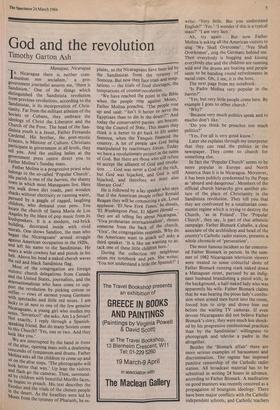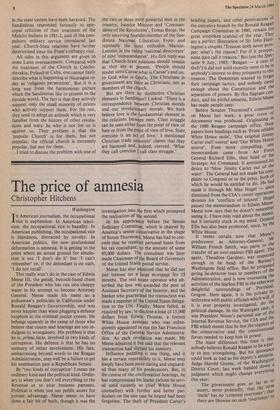God and the revolution
Timothy Garton Ash
Managua, Nicaragua in Nicaragua there is neither com- munism nor socialism,' a pro- government journalist assures me, 'there is Sandinism.' One of the things which distinguished the Sandinista revolution from previous revolutions, according to the Sandinistas, is its incorporation of Chris- tianity. Far from the militant atheism of the Soviets or Cubans, they embrace the ideology of Christ the Liberator and the Church of the Poor. The head of the San- dinista youth is a Jesuit, Father Fernando Cardenal. His brother, the poet-mystic Ernesto, is Minister of Culture. Christians Participate in government at all levels, they tell you. And the smiling ladies at the government press centre direct you to Father Molina's Sunday mass. Father Molina is a progressive priest who
belongs to the so-called 'Popular Church'. His parish is one of the barrios, the shanty town in which most Managuans live. Here You walk down dirt roads, past wooden shacks without electricity or running water, Pursued by a gaggle of ragged, laughing children, who demand your pens. You locate the church of Santa Maria de Los Angeles by the blare of pop music from its loudspeakers. It is a modern, red-brick building, decorated inside with vivid murals. One shows Sandino, the man who began the Nicaraguans' armed struggle against American occupation in the 1920s, and left his name to the Sandinistas. He wears a wide cowboy hat and pistols in his belt. Above his head a naked cherub waves the red and black Sandinista flag.
Most of the congregation are foreign
visitors: church delegations from Canada and the United States, journalists, and the internationalistas who have come to sup- port the revolution by picking cotton or coffee — rows of earnest young Germans with spectacles and little red noses. I am lucky to sit next to one of the few genuine Nicaraguans, a young girl who studies my notes. `Sovietico?' she asks. Am I a Soviet? Not exactly, I reply through a Spanish- sneaking friend. But do many Soviets come to this Church? 'Yes, one or two. And they look like you.' We are interrupted by the band in front of the altar, opening mass with a deafening crescendo of tympanum and drums. Father Molina asks all the children to come up and sit on the altar steps. 'The photographs will look better that way.' Up leap the visitors and flash go the cameras. Then, surround- ed by children with beautiful Murillo faces, he begins to preach. His text describes the E. xodus and the trials of the chosen people in the desert. As the Israelites were led by Moses from the tyranny of Pharaoh, he ex- plains, so the Nicaraguans have been led by the Sandinistas from the tyranny of Somoza. But now they face trials and temp- tations — the trials of food shortages, the temptations of counter-revolution.
`We have reached the point in the Bible when the people rose against
Moses,' Father Molina preaches. 'The people rose up and said: "Isn't it better to serve the Egyptians than to die in the desert?" And today the conservative parties are boycot- ting the Council of State. This means they think it is better to go back to life under Somoza, when the Yanquis financed the country. A lot of people saw God being manipulated by reactionary forces. Today we have a revolutionary project in the name of God. But there are those who still refuse to accept the alliance of God and revolu- tion ... God was never a God of the rich, but God was hijacked, and God is still hijacked, and therefore we must also liberate God.' He is followed by a lay speaker who says that if the American people reflect Ronald Reagan they will be committing a sin. Loud applause. 'El New York Times,' he shouts, 'El Washington Post, El Miami Herald — they are all telling lies about Nicaragua.' `Viva proletarian internationalism', shouts someone from the back of the church. `Viva', the congregation responds. Why do the Americans want to attack us? asks a third speaker. 'It is like me wanting to at- tack one of these little children here.'
During the collection my neighbour seizes my notebook and pen. She writes: `You not understand a little the Spanish?' I write: `Very little. But you understand English?' Yes."I wonder if this is a typical mass?"I am very lazy.'
Ah, try again ... But now Father Molina is asking all the American visitors to sing 'We Shall Overcome'. 'Vee Shall Overkomm', sing the Germans behind me. Then everybody is hugging and kissing everybody else and the children are running wild and the drums are beating and people seem to be handing round refreshments in metal cups. Oh, I see, it is the host.
The next page from my notebook: `Is Padre Molina very popular in the barrio?'
`Yes, but very little people come here. By example I goes to other church.'
'Why?'
`Because very much politics speak and to mucho don't like.'
`Do you think he preaches too much politics?'
`Yes. For all is very good know.'
Later she explains through my interpreter that they can read the politics in the newspaper. They come to church for something else.
In fact the 'Popular Church' seems to be more popular in Europe and North America than it is in Nicaragua. Moreover, it has been publicly condemned by the Pope as 'absurd and dangerous'. Members of the official church hierarchy give another pic- ture of the place of Christianity in the Sandinista revolution. They tell you that they are confronted by a totalitarian com- munist regime which is trying to destroy the Church, 'as in Poland'. The 'Popular Church', they say, is part of that atheistic campaign. Father Bismark Caballo, a close associate of the archbishop and head of the country's Catholic radio station, presents a whole chronicle of 'persecution'.
The most famous incident so far concern- ed Father Bismark in person. In the sum- mer of 1982 Nicaraguan television viewers were treated to some colourful shots of Father Bismark running stark naked down a Managuan street, pursued by an indig- nant husband brandishing a pistol with, in the background, a half-naked lady who was apparently his wife. Father Bismark claims that he was hearing the pious lady's confes- sion when armed men burst into the room, forced him to strip and drove him out before the waiting TV cameras. If even devout Nicaraguans did not believe Father Bismark's story, they were much less shock- ed by his progressive confessional practices than by the Sandinistas' willingness to photograph and televise a padre in the altogether.
Besides the 'Bismark affair' there are more serious examples of harassment and discrimination. The regime has imposed punitive censorship of the Catholic radio station. All broadcast material has to be submitted in writing 24 hours in advance, according to Father Bismark. A meditation on good manners was recently censored as a propagation of bourgeois ideology. There have been major conflicts with the Catholic independent schools, and Catholic teachers
in the state system have been harassed. The Sandinistas responded furiously to epis- copal criticism of their treatment of the Miskito Indians in 1981-2, and of the com- pulsory military service introduced last year. Church-State relations have further deteriorated since the Pope's unhappy visit.
All sides in this argument are given to some Latin overstatement. Compared with the treatment of the Church in Czecho- slovakia, Poland or Cuba, one cannot fairly describe what is happening in Nicaragua to- day as 'religious persecution'. But it is a long way from the harmonious picture which the Sandinistas like to present to the outside world. The fact is that they actively support only the small minority of priests who actively support them. For the rest, they tend to adopt an attitude which is very familiar from the history of other revolu- tions and wars: he who is not for us is against us. Their problem is that the `popular Church' is for them, but not popular; the official church is extremely popular, but not for them.
I tried to discuss the problem with one of the two or three most powerful men in the country, Interior Minister and `Comman- dante of the Revolution', Tomas Borge, the only surviving founder-member of the San- dinista National Liberation Front and reputedly the most orthodox Marxist- Leninist in the ruling 'national directorate' of nine 'commandantes'. His first reply was that Church-State relations should remain as they are at present. 'People should render unto Caesar what is Caesar's and un- to God what is God's. The Christians in government are there as Christians, not as members of the church.
But are there no distinctive Christian elements in Sandinism? I asked. 'There is a correspondence between Christian morals and our revolutionary morals. We both believe love is the fundamental element in the relations between men. Class struggle can be seen either from the point of view of hate or from the point of view of love. State, coercion is an act of love.' I mentioned Christian trade unionists' claims that they are harassed and, indeed, coerced. 'What they call coercion I call class struggle.'











































 Previous page
Previous page